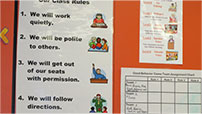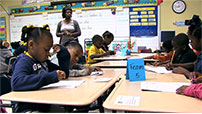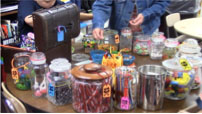

The Good Behavior Game is a classroom management strategy that promotes positive behavior and has shown positive long-term impacts for students.
The Good Behavior Game helps teachers keep focused on managing their classrooms and helps children take ownership for their own behavior. I know that if there is good behavior in the classrooms then I’m not going to have to worry about disciplining children outside of the classroom.

PrincipalBaltimore City Public Schools
Teachers play the game with their class while students are completing independent or group assignments in small teams. Students learn teamwork; they receive positive reinforcement for promoting and following classroom rules; and they practice monitoring and managing their own behavior.
While the Good Behavior Game is played, teachers monitor teams to ensure they are following each of the class rules. If team members break a rule, that team receives a check mark. Teams that receive four or fewer check marks win the game and receive positive reinforcement to encourage future success.
The game is not a curriculum and does not compete with instructional time. In the beginning of the school year the Good Behavior Game is intended to be played three times a week for approximately 10 minutes at time. At the end of the school year, a teacher may play the game daily for up to 30 or 40 minutes.
The Good Behavior Game is built around four core elements.




The Good Behavior Game is grounded in two theories: Life Course/Social Field Theory and Behavior Theory. These theories serve as the foundation for the game and provide support for the program’s effectiveness.
![]()
This theory holds that as we progress through life, we meet people who serve as “natural raters.” These people help identify what tasks or behaviors are expected of us and how well we are performing these tasks. In a school, these natural raters are teachers and peers who help students determine what skills they must acquire to be successful in the classroom for future success. Skills learned in one social field such as the classroom help students to be successful in other social fields such the workplace.
The Good Behavior Game is a team-based classroom behavior management strategy which helps children master the role of student and be successful at the key demands of the classroom.
The Good Behavior Game is an evidence-based intervention. In the short term, the game helps reduce aggressive and disruptive behavior in the classroom and over time, these same students are less likely to be referred for academic or behavioral services, to misuse drugs and alcohol, and have lower rates of suicidal idealization, depression, and incarceration than their peers who did not play the game.
The Good Behavior Game is designed to help socialize children into the role of student. The game helps early learners develop skills such as concern for peers, sitting still, paying attention, and completing school work that will provide a foundation for success throughout their schooling and into early adulthood.
The Good Behavior Game is a universal intervention designed to be played with all students. By integrating the game into a regular classroom routine, students internalize expected classroom behaviors and begin to apply them throughout the day. While the Good Behavior Game is beneficial to all students in the classroom, it is of particular benefit to male students already showing signs of aggressive/disruptive behavior when they enter the first grade.
Good Behavior Game training includes three days of face-to-face training, ongoing coaching throughout the school year, and all of the materials needed to play the Game.
Good Behavior Game coaches must have a master's degree or higher in education or a related area; five or more years of experience as a teacher; and two years of experience as a teacher leader, school coach or mentor. Good Behavior Game coaches are generally hired by the state or district education agency through which the game is being implemented and often have the opportunity to become local Good Behavior Game trainers over time.
Interested to learn more? Ready to start discussions of how Good Behavior Game could fit the needs of your classroom, school, district, or state? Contact us!
The Good Behavior Game is played in teams while the students are working together on independent assignments or collaboratively. Students adhere to four classroom rules while teachers monitor students and students monitor both their own behavior and that of their teammates.
The Good Behavior Game can be played anywhere. Most teachers begin to play the Game in the classroom to set their students up for success, but over the course of the year, it can become an effective tool in managing student behavior in the lunchroom, in the hallways, on field trips, or at any other point in the day where teachers seek to clarify student expectations.
The Good Behavior Game is a strategy, not a program. As a result, playing the game does not take time away from instruction. In fact, research shows that playing the Good Behavior Game actually leads to increased instructional time for most teachers. The game is a universal intervention that easily pairs with more targeted and intensive interventions as part of a tiered intervention framework. It can be used in concert with additional individualized strategies or as a standalone strategy designed to be of benefit to the whole class.
Teachers who play the Good Behavior Game in their classroom have reported a reduction in disruptive and off-task behavior, increased time to teach, and greater job satisfaction by the end of the year. Student outcomes of the Good Behavior Game can be seen as early as first grade and continue into early adulthood. Learn more about the impacts of the Game.
The Good Behavior Game is played on teams to help students connect with peers and skills to monitor their own behavior as well as the behavior of others.
Positive reinforcement encompasses encouragement, praise, or other tangible and intangible reinforcers designed to encourage positive behaviors.
The Good Behavior Game is set-up to facilitate student success. Positive reinforcement is provided on both a daily and weekly basis in an effort to ensure that all students receive positive reinforcement to play the Game each week. At the beginning of the year, teachers play under circumstances that are most likely to lead to all student teams winning the Game. Teachers make the game more challenging as students demonstrate mastery expectations. When students do not win, teachers do not draw attention to the loss, instead focusing on celebrating the successes of the winning teams and reminding all students that they will have another opportunity to win soon.
Headquarters
1400 Crystal Drive, 10th Floor
Arlington, VA 22202-3289
+1.202.403.5000 | AIR.ORG
© 2009–2021 American Institutes for Research. All rights reserved.